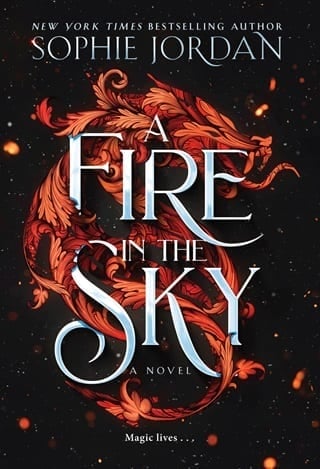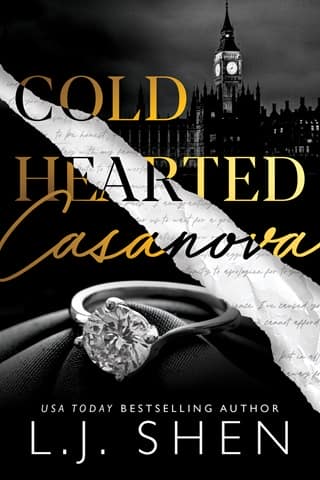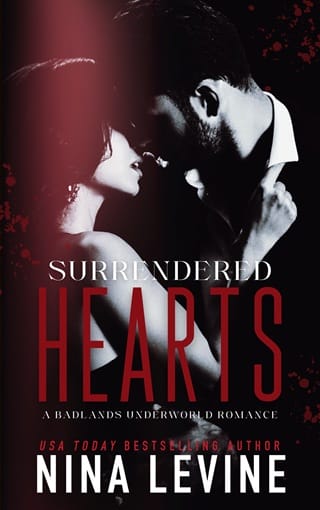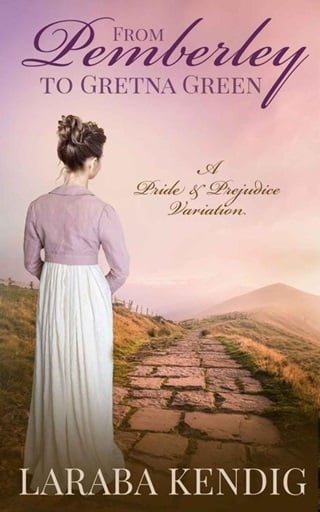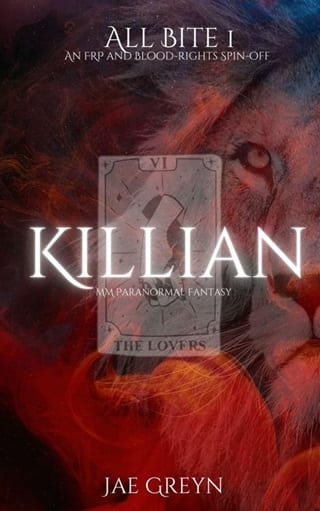13. Tamsyn
13
Tamsyn
T HEY THOUGHT THE JOURNEY WOULD brEAK ME.
It was the hope. At least it was Lord Arkin's hope. I had since learned his name after his not-so-vague threat. It seemed wise to know all you could about your enemies, and it was clear to me that Arkin was determined to be my enemy.
It was not yet clear, however, what I would be to Fell. Or he to me.
The other warriors cast looks of disdain in my direction as we made our way north. I was an outsider, a proven deceiver, and they did not hide their contempt. They viewed me as a bumbling, inept addition to their party. Little did they know, I was made of sterner stuff. Life had conditioned me for this. I was not glass. I did not break. I was bred to survive.
As arduous as the hours in the saddle proved to be, I ignored the discomfort and clung to my composure, studying the changing landscape. I'd never ventured this far from home. The coastline to the south of the City, where our summer villa was located, was smooth and flat with tall willow grass that curled like fingers in the sun-kissed breeze. It took only a couple of hours by carriage to reach there. This was decidedly more vigorous an excursion, and the sun kissed nothing here.
The farther north we progressed, the more untamed our surroundings became. The trees grew bigger, taller, greener; the brushwood wild and overgrown in a tangle of land. The terrain, laden with fog, undulated in soft hills and valleys, in readiness of the mountains to come.
I'd never before felt the throb of the world in my bones, the whisper of grass in my ears. Never heard the birds or animals shifting and chittering in the unrelenting press of the countryside. Even the rocks possessed a heartbeat. A flow. Blood whooshed through the veins of the earth beneath me.
It felt as though we were leaving civilization behind. There were no towns and few villages, and those villages we passed through were humble, meager affairs full of decrepit thatched-roof cottages. Dogs with jutting rib cages gave our party a wide berth. Children with dirt-stained faces peered out from shutterless windows into the misty air. Their hollow eyes made them appear far older than their tender years. Slump-shouldered, bone-thin women pumped water at the wells. Men were scarce, ostensibly breaking their backs somewhere in the mines or in the distant fields. It was scarcely the prosperity of the City.
"Not what you're accustomed to, is it?" the dark-haired sword maiden beside me asked, her wiry body rolling easily with the motion of her mount as we followed the winding road into higher country. Her name was Mari, and she was the only one who deigned to speak to me, and for that she was my favorite person.
I cleared my throat. "No, it is not."
"Deprivation isn't pretty."
"How...? Why—?" I started, at a loss in the face of so much suffering.
"Penterra pours all its wealth into keeping its ruling class and allies abroad happy. Can't lose their support." Her voice twisted bitterly. "They don't give much attention to those in need here at home." She nodded to Fell ahead of us. "That's why he was determined to marry you. Well. A princess of Penterra, anyway." She continued talking as though she had not just delivered a blow. "He wanted a seat at the table, so his voice could be heard, so he could make a difference."
Oh. Oh.
So he had failed in his quest. Because he was stuck with me.
At least he thought he had failed. As did the rest of them. Their cold attitude toward me made even more sense now. I swallowed miserably. I thought Fell just wanted to marry one of my sisters, because what man didn't want the great prize of a princess? I had thought it was ego and greed and status-seeking. I had not felt much remorse over tricking him, considering all of that. But now that I understood his motives, I saw myself the way they all did. Not only as a deceiver, but as a poison, tainting and spoiling their great hope.
A baby started wailing from inside one of the cottages. The muffled sound ricocheted in the murky air. I'd heard babies cry before, but this sounded different. There was pain and need in it. Hopelessness in the disembodied sound that lifted up like a wraith on the air. A ghost child trapped in misery.
Cold shivered down my neck and spine. I felt sick as my gaze swept over the dying village. I knew this was none of my fault, but I had not stopped it. I had not prevented it from continuing. I had not helped these people. Marrying Fell, stopping him from gaining the power he needed to make a difference in their lives, had only made things worse, only pushed innocents deeper into the abyss.
I blinked my stinging eyes, lifting them to Fell ahead of me, but he wasn't there anymore. He had fallen out of line. He moved toward a well, where several women stood, warily clutching their buckets at his approach. I watched, my breath catching in my chest as he reached inside the satchel draped over his saddle. He said something. His lips moved as he tossed several coins down to them.
The women grasped the coins gratefully, calling out their thanks as he turned back around, nudging his destrier into a trot. His gaze met mine, but I could not bring myself to hold his stare for very long. Not with this sudden knowledge that I had foiled his plans—that these plans were even necessary, that my father was such a terrible ruler. My throat closed. A terrible ruler. But what else would you call a king who let his people starve?
Shaking my head, I got out tightly, "I thought things were supposed to be better after the Threshing."
That was the whole point behind the war against dragonkind. It was the doctrine espoused by the throne. Not to mention the dogma spoon-fed to me in the schoolroom. The Threshing may have lasted for centuries and cost innumerable lives, but it was supposed to have fixed everything. It had been necessary and, ultimately, successful. And... it was over.
Finished. Done. Ended a hundred years ago with the Hormung.
So why was Penterra like this now? Why was there still such misery?
Humans had blamed dragons for all ills: drought, famine, disease. To say nothing of the destruction of the occasional village or town that fell prey to their fiery wrath. Dragons had sat on great caches of treasure, prospering whilst man wallowed, eking out the barest existence. The Threshing was humanity's way of turning the tables and ridding dragons from the pecking order forever. It had solved all our problems. At least that was the belief.
Mari shrugged in response and murmured, "Makes you wonder."
"Wonder?" I echoed.
"Whether dragons were the real problem," she finished.
A slap could have no more astonished me. I glanced around sharply. Such talk felt almost... sacrilegious. I'd never heard anyone say such a thing. She was a sword maiden. She lived in the Borderlands, the place where the bloodiest, most fearsome fighting had taken place against dragons. Now, however, instead of dragons, the fighting was against bandits who had taken up residence in the dragon-free Crags and against invading soldiers from Veturland who dared to cross the border.
I didn't reply. I couldn't. But Mari's observation sat with me as we rode on, a heavy stone grinding against my chest.
Whether dragons were the real problem.
Certainly all the wealth that had been uncovered from the dragon troves had since been dispensed. And famine and disease were still here. Destroying the dragons had not destroyed those things. Indeed not. And this, coupled with the other revelation of the day—that Penterra was not as prosperous as I had been led to believe, that my father was no great king—was something of an adjustment for me.
I glanced at the broad expanse of Fell's back ahead of me, wondering if he shared the opinion of this sword maiden. Did he think the Threshing had been pointless, too?
As the son of Balor the Butcher, and the great-grandson of the border king responsible for the victory of the Hormung, he couldn't possibly. The Lord of the Borderlands had to be bloodthirsty and single-minded in everything, just like his forefathers.
Dryhten was a killer without regret. Not someone who looked back at his father's legacy and thought any part of it was a mistake.
Not someone who would happily accept being married to the wrong woman.
I WAS NOT prepared for this new world.
The crossing offered no comfortable quarters. No warm bed. No generous meals. No freshly laundered clothes. No maids helping me with my toilette. No casual beatings. I gave my head a small, fierce shake. I had never minded that before. That had been my duty. An honor bestowed upon me. My service to the throne.
Just as this was my duty, too.
It wasn't as though my former life had been free of threats. It was only that the crack of the whip against my skin had been familiar. At least at home, I knew what to expect. Here, everything was unpredictable. I felt as though I was balancing on a rope—one misstep and I would topple over.
Home. The palace was not my home. Not anymore. I would have to stop thinking of it as such. I had no home at all. No hearth to warm my feet by, with loved ones surrounding me. And yet I could not think of my home as the Borderlands either, a place I had never even been. The mist-shrouded foothills of lore. With him, the Beast, who did not want me as his bride. It was impossible to comprehend.
The Beast. My husband—
I could not finish the thought. When would thinking of him as my husband not feel strange? Not untrue? When would it not result in this unremitting squeeze in my chest?
When would I no longer feel an intruder among these border warriors? Beside him ?
Despite his flash of anger on the night of our bedding, Fell was less transparent than his warriors. They treated me to cutting glares, but he never even looked at me as we rode. Just that brief meeting of our gazes in the village, in which I thought I'd read accusation in the gray frost of his eyes before I looked away.
There was no conversation between us. He was stoic, cold, and indifferent.
And that was perhaps worse. His anger would have been preferable to the icy silence.
He withheld his company, and I wondered if this was how it would be between us. Would we never get beyond our shaky start? Would we live as strangers forever? Would I live at all? I shuddered. That was Stig talking. The memory of his voice pushing through, angry and bitter. He could kill you and no one would do anything about it.
I swallowed against a lump in my throat. I could not help it. The doubt. The fear. They sank deep. Clamping teeth that would not release me.
Whenever we stopped, Fell disappeared, and Mari stepped forward, tasked with my care. I was grateful for her. She guided me into the woods to relieve myself and bedded down beside me each night. There were no tents erected. Indeed, they did not worry about such things as comfort. She saw that I ate and instructed me on rolling out my bedding at night and packing it away each morning. I took her grunts as approval that I was doing everything correctly.
A weary sort of monotony fell into place. A rhythm of waking, riding through air that felt like cold soup, eating food tasteless on my tongue, bedding down on hard earth. Repeat.
I would often look up and catch Arkin staring at me. His gaze was more than malevolent. His eyes felt faintly scheming and made the tiny hairs at my nape vibrate.
Whenever I searched out Fell to see if he noticed his man's fixation on me, I found my husband elsewhere, paces away or with the horses or nowhere to be seen at all. Avoiding me. He had told Stig I was his, but he didn't seem to care about me. Perhaps he had changed his mind and decided I was too much trouble and not worth keeping around.
He could kill you and no one would do anything about it.
No matter how I tried, in these dark moments—riding, plodding along—I could not get Stig's words out of my head where they had burrowed deeply.
Fell's indifference stung more than I would have liked to admit, and I began to consider something I had never dared.
I thought about it carefully in the silent hours, and there were plenty of those—hours during which I never spoke, hours during which no one spoke to me.
I toyed with the idea, testing it out cautiously, like it was a new pair of shoes that had not yet been broken in, experimenting with the notion that maybe, just perhaps, I should take my chances and run away.
 Fullepub
Fullepub 